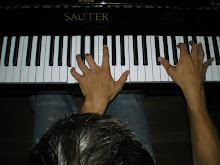"My feelings were disturbed ... I found in myself a willingness to connect the music with evil and with power. I don't want such a power in my life. If it was something political it would resemble fascism" (John Cage, 1982).
When cage made this comment on Branca's loud, experimental-punk influenced music, he was hitting on something very relevant, a criticism that hits harder on this music, and other music like it, than any other critique I've seen. To describe it, as essentially musical fascism has a surprisingly sturdy foundation when we look at fascism more academically.
Fascist ideology, speaking broadly, is the ideology of power, the glorification of violence and militarism, the cult of the personality, and the desire for totalitarian oppression. It is anti-capitalist, anti-marxist, anti-socialist, anti-feminist, anti- democratic, anti-egalitarian, and anti-rational. yet it is not sufficient to simply define Fascism by what it isn't. Turning to the so called "fascist minimum" we can get a better picture of this cult of violence and action. Michael Mann in his book Fascists writes that the five elements of the fascist minimum can be listed as 1) hyper-nationalism, 2) Cleansing, or top-down purging and/or oppression and elimination of defined enemies, 3) paramillitarism
Music which seeks to overwhelm the ears, as Cage viewed it, was totalitarian music, and its aim was express that power and violence. What is interesting about this impulse within the music, is that within other musical circles the authoritarianism and violence of sound becomes manifest within the minds and actions of people. There exists, and has long existed a link between skinhead neo-nazi groups with Death-metal, speed-metal and hard-core punk. This aint a coincidence. Modern punk, and metal-skinhead groups consist of disaffected male youth who clearly glorify and enjoy violence, paramillitarism and action. They might don the apparel of a militaristic organization and fight against some abstracted, vaguely defined enemy. These types of people probably suffer from the acute anomie that sociologists ascribe to the fascist recruits of the early 20th century. These hooligans of the contemporary age mirror that identical type of group that helped push Mussolini into power, and helped terrorize the jews during the 30s. The age of most fascists, like hardcore punk/metal-skinheads, were 18-35, and they were predominantly male.
While it would be stupid to call Branca a fascist (i dont know his politics), it is not a stretch to see a parallel between the manifestation of aggression within sound and the emotional effect of creating an agressive mentality within the listener. Driving, deafening music controls your hearing, it can blast you, like a bombastic parade, into an excited emotional state. Punk-rock prides itself on action, movement and excitement. It asserts a clearly anti-commercialist, anti-intellectual, anti-status-quo mentality, and comes as a prefab identity for many followers and loyal fans. They dont wear arm bands, but they do wear tee shirts.
But does this really condemn any music at all? most music is disliked (or, conversely enjoyed) more for its association than for its actual musical language. So what does someone do when confronted with an art that might be tainted by fascist influences? Even After learning about the futurist affiliation with fascists, I still love futurist works-in-themselves, even if they're creators were very much lost. So does art stand alone despite the people who create, support, or help create it ( with a glance towards Karajan) ?
Lahti
1 year ago
